Lit only by candlelight and a soft overhead stagelight, shadows gently dance over the set of a derelict home. There are blood stains on the pillow, on the couch and on the painting on the wall. Black graffiti of “nevermore” and “Niantic Falcons!” cover the homely wallpaper of the once-abandoned house. Feathers protrude from the hole in the now boarded up window, and a two by four bars the boarded up door. There are two people: a woman who is awake and moving slowly throughout the house, and a man asleep on the couch using the bloody pillow. Suddenly, there is a tapping and birds call out. The woman cowers and stares upward, fearful of the avian menace outside.
Before the play even starts, this opening introduction to Conor McPherson’s The Birds at the Station Theatre, directed by Thom Schnarre, sets a great tone for the play. The Celebration Company does an excellent job of setting the mood and portraying this sense of dread. Yet the performances can’t help this adaptation as the play turn towards a trite and dated interpretation of an apocalyptic scenario.
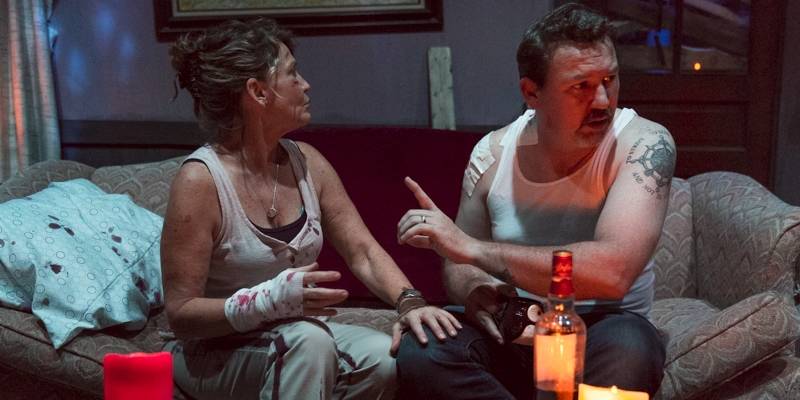
In a beach cottage somewhere in New England, the writer Diane (Carolyn Kodes) nurses Nat (Jeremiah J. Lowry) back to health after finding him on the road. They seek shelter from the murderous birds in a deserted house. As time passes, they scavenge for food and other supplies when the birds leave with the tide. Diane is calm and motherly but also solitary and independent. Nat, by contrast, is simple and takes comfort in fixing things. They eventually encounter Julia (Krystal Moya), a young woman of dubious character. At first Julia seems to fit into Nat and Diane’s “homelife”, but as time passes, tensions builds. The trio argue over scavenging further out. Diane questions Julia’s miraculous find of supplies one day. They 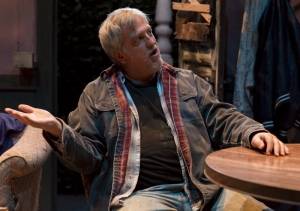 reconcile and bond a little, but soon Diane and Julia are arguing over Nat and if the three should venture further out for supplies. Then things become even more complicated when Tierney (Lincoln Machula) shows up. Both menacing and believable as the farmer across the lake when he arrives during his short scene with Diane, I felt Machula ratcheted up the tension another notch when I needed it.
reconcile and bond a little, but soon Diane and Julia are arguing over Nat and if the three should venture further out for supplies. Then things become even more complicated when Tierney (Lincoln Machula) shows up. Both menacing and believable as the farmer across the lake when he arrives during his short scene with Diane, I felt Machula ratcheted up the tension another notch when I needed it.
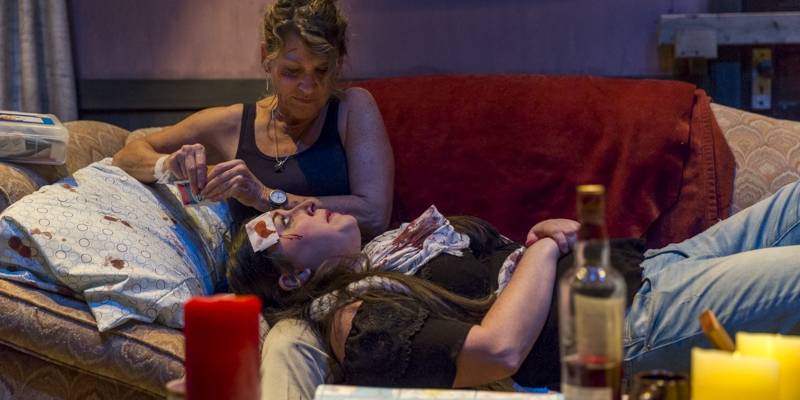
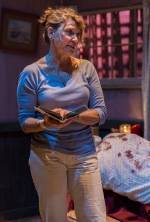 At times, I had a hard time believing the other actors in their roles. Kodes’ maternal, strict tone of voice felt appropriate at the start. She is controlling as she takes stock of the
At times, I had a hard time believing the other actors in their roles. Kodes’ maternal, strict tone of voice felt appropriate at the start. She is controlling as she takes stock of the 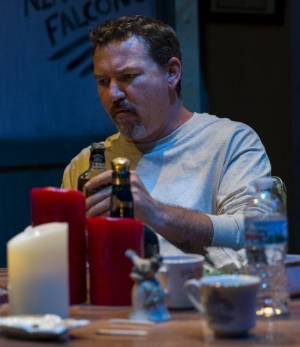 supplies and rations things. However, towards the end of the play, Kodes’ same tone of voice sounded too rehearsed and purposeful rather than natural. Moya strived for subtlety, but her volatility in some scenes also felt rehearsed. Lowry was believable as the simple and hard-working Nat. Yet I wonder if he could’ve pushed his emotions more to the surface at the play’s end.
supplies and rations things. However, towards the end of the play, Kodes’ same tone of voice sounded too rehearsed and purposeful rather than natural. Moya strived for subtlety, but her volatility in some scenes also felt rehearsed. Lowry was believable as the simple and hard-working Nat. Yet I wonder if he could’ve pushed his emotions more to the surface at the play’s end.
As stated in my introduction, the mood and setting of the play by the stage design, sound, and lighting set the tone for The Birds. Niccole Powers scatters fake birds throughout the beachside cottage set. There is a parrot cookie jar, ceramic birds on a shelf, and a small bird nest headpiece for instance. Since we only hear the avian menace and we don’t see it, finding all of the bird references proved engaging for me. Similarly, Brian Hagy does a great job of conveying different times of day and often letting only the candles on the set to light the space for dramatic effect. Because actual and fake birds were not used, Mike Prosise brings the avian flocks to life with a variety of bird calls, caws, squawks, and cries. The tapping sounds also help to build up the tension as the birds make their presence known to the humans in the abandoned beach cottage. Plus combining the voices of cast members Mikel J. Matthews, Jr., Jason Dockins, Thom Schnarre, and Renee Lynn Jackson for the last radio broadcast must have been an entertaining challenge. The use of classical music gave the play an almost timeless quality as well. Overall the entire production team did an excellent job of setting the stage for the actors. However, the performances and play’s writing left something more to be desired.
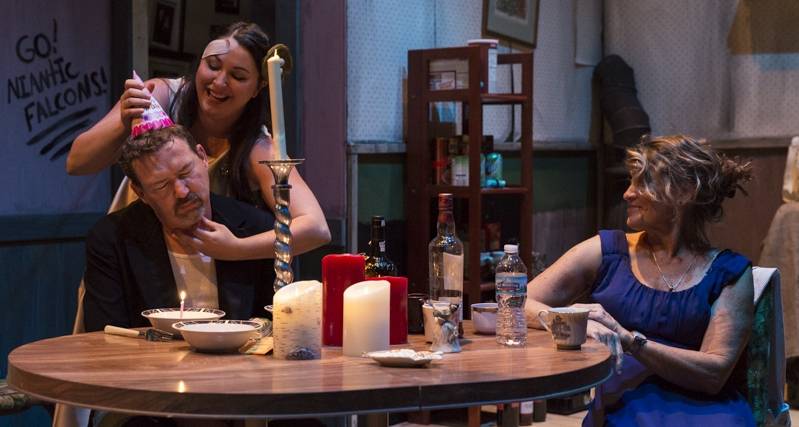
Ultimately, I was not a fan of playwright McPherson’s choices for ending The Birds. I don’t want to give the ending away, but I found the last few scenes and Diane’s final monologue left a bad taste in my mouth. McPherson’s play starts with mutual survival in a confined space with both sexes working together. The Birds ends with some bad, gendered characterization and thinking that felt like something out of the 1940s instead of 2017. I’d have had an easier time believing Diane’s choices if this dated explanation for her motivations was omitted. In order to figure out what I’m alluding to, you should head over to the Station Theatre and see The Birds for yourself; you may come to a different conclusion than me.
—
The Celebration Company at the Station Theatre will be performing Colin McPherson’s The Birds until November 19th. Performances begin at 8 p.m. Tickets are $10 on Wednesdays, Thursdays, and Sundays, and $15 on Fridays and Saturdays. More information along with making a reservation can be found at their website.
All images by Stephen Kemp.
Sarah Keim is a contributing writer for Smile Politely’s Arts section. She’s a bit of recluse on social media, but you might bump into her out in the wilds of C-U. Frequent sightings occur at local breweries and movie theaters.









 Sarah Keim is a contributing writer for Smile Politely’s Arts section. She’s a bit of recluse on social media, but you might bump into her out in the wilds of C-U. Frequent sightings occur at local breweries and movie theaters.
Sarah Keim is a contributing writer for Smile Politely’s Arts section. She’s a bit of recluse on social media, but you might bump into her out in the wilds of C-U. Frequent sightings occur at local breweries and movie theaters.